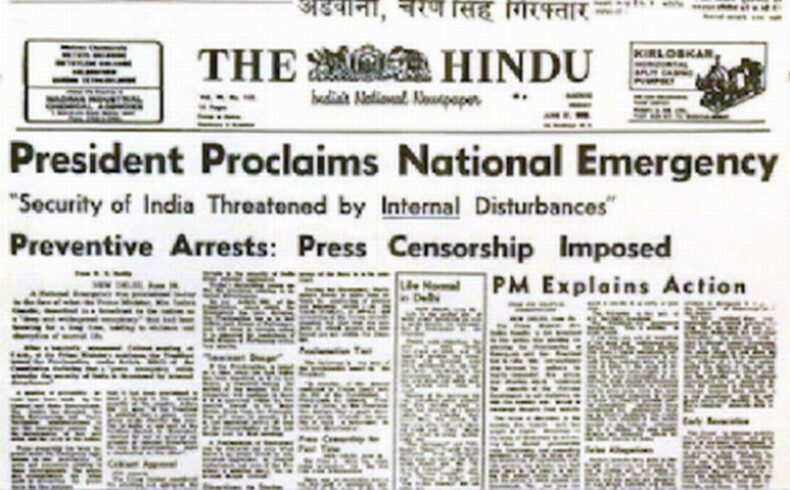PM Modi stressed that it is imperative to remember June 25, the dark day when the Emergency was imposed on the nation by PM Indira Gandhi. He reaffirmed that India, as the mother of democracy, upholds democratic values and regards the Constitution as supreme.
Prime Minister Narendra Modi emphasized that the period of Emergency in India’s history was a dark era marked by the oppression of those who supported democracy. He reaffirmed that India, as the mother of democracy, upholds democratic values and regards the Constitution as supreme.
Thus, he stressed that it is imperative to remember June 25, the day when the Emergency was imposed on the nation. The Emergency was imposed in 1975 during the tenure of Prime Minister Indira Gandhi.
India’s disaster management capabilities
During his radio broadcast, known as Mann Ki Baat, on June 18, Prime Minister Modi also commended India’s growing capacity to handle natural disasters. He expressed confidence in the people of Kutch, assuring them that they would swiftly recover from the devastation caused by Cyclone Biparjoy.
He recalled how, after a devastating earthquake two decades ago, there were doubts about Kutch’s ability to bounce back from such destruction.
However, the people of Kutch managed to rebuild their lives and recover from the disaster. Prime Minister Modi highlighted the progress made in India’s disaster management capabilities in recent years, stating that the country is becoming an example in this regard.
Cyclone Biparjoy made landfall near Jakhau on the evening of June 15, causing significant damage in the Kutch and Saurashtra regions of Gujarat.
Prime Minister Modi explained that he had chosen to hold his Mann Ki Baat broadcast on June 18 instead of the last Sunday of the month due to his upcoming trip to the United States.
While he was on his visit, he looked forward to taking part in the International Yoga Day event held at the United Nations headquarters in New York.
Addressing the issue of tuberculosis (TB)
In addressing the issue of tuberculosis (TB), Prime Minister Modi stated that India has set a target to eliminate the disease by 2025. The Pradhan Mantri TB Mukt Bharat Abhiyaan (Ni-Akshay Mitra Initiative), implemented by the Ministry of Health & Family Welfare, plays a crucial role in this effort.
He commended the Ni-Akshay Mitra initiative and highlighted the involvement of thousands of people in rural areas who have taken on the responsibility of supporting TB patients.
He regarded this as a testament to the true strength of India, with even the youth contributing to the goal of eradicating TB by 2025.
Chhatrapati Shivaji Maharaj
Remembering Chhatrapati Shivaji Maharaj, a revered historical figure, Prime Minister Modi praised his bravery and governance skills. He emphasized that there is much to learn from Shivaji Maharaj, particularly in terms of water management and the navy, which continue to enhance India’s historical legacy.
He further noted that the forts constructed by Shivaji Maharaj still stand proudly in the sea, centuries after their construction, serving as a source of pride for the nation.
Reviving an extinct river in the Hapur district of Uttar Pradesh.
Prime Minister Modi also acknowledged the efforts of the people in reviving an extinct river in the Hapur district of Uttar Pradesh.
He highlighted the development of the river’s source as an Amrit Sarovar (a sacred pond associated with immortality). This achievement demonstrated the community’s commitment to environmental conservation and water rejuvenation
Prime Minister Narendra Modi’s recent statements and observations shed light on various important aspects of India’s history, current challenges, and future aspirations.
Conclusion
By emphasizing the dark era of the Emergency, he underscored the significance of upholding democratic values and respecting the Constitution.
Additionally, his acknowledgement of India’s increasing disaster management capabilities and the nation’s resilience in the face of natural disasters showcased the progress made in safeguarding communities and rebuilding after calamities.
Prime Minister Modi’s commitment to eradicating tuberculosis by 2025 through the Ni-Akshay Mitra initiative exemplifies the government’s dedication to public health and the welfare of its citizens.
By recognizing the contributions of thousands of individuals in rural areas, he highlighted the collective strength of the nation in achieving this ambitious target.
Furthermore, his reverence for historical figures like Chhatrapati Shivaji Maharaj and their accomplishments demonstrated the importance of preserving and learning from India’s rich heritage.
The Prime Minister’s endorsement of yoga as a transformative practice for daily life reinforces the promotion of holistic well-being and mindfulness among the populace.
Overall, Prime Minister Narendra Modi’s speeches and observations reflect his vision for a progressive and resilient India. By addressing crucial issues, celebrating achievements, and inspiring citizens to take part in the nation’s development, he seeks to build a brighter future for the country and its people.













